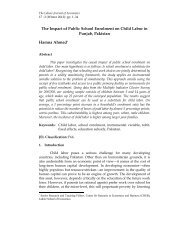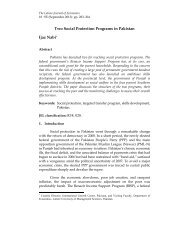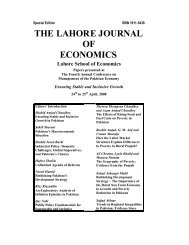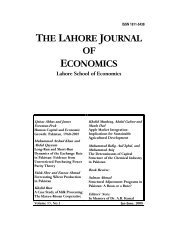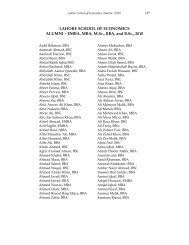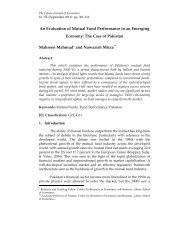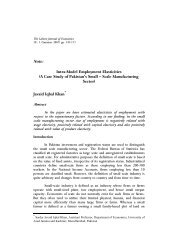Special Edition-07.pdf - Lahore School of Economics
Special Edition-07.pdf - Lahore School of Economics
Special Edition-07.pdf - Lahore School of Economics
You also want an ePaper? Increase the reach of your titles
YUMPU automatically turns print PDFs into web optimized ePapers that Google loves.
Reforming the Government in Pakistan: Rationale, Principles & Proposed Approach 5<br />
(C) Changes in Pakistani Scene<br />
We now turn to the diagnostic studies and the changes that have<br />
taken place in the landscape in Pakistan in the past several years and are<br />
likely to affect the functioning <strong>of</strong> the government in the future. A number<br />
<strong>of</strong> commissions, committees, task forces, and working groups have examined<br />
and made recommendations about the changes in our administrative system.<br />
These recommendations and studies have been scanned and sifted and the<br />
proposals that are still relevant and useful will form part <strong>of</strong> the NCGR’s<br />
recommendations. But in addition to the historical reasons there have been<br />
at least seven new developments in the last few years that clearly point to<br />
the need for reforms in the structure, processes and human resource<br />
management policies and practices.<br />
First, it is becoming increasingly apparent that the benefits <strong>of</strong><br />
economic growth have not been distributed equitably among the lower<br />
income groups, backward districts, rural areas and women. Although the<br />
government has used the channels <strong>of</strong> devolution and poverty targeted<br />
interventions to spread these benefits, the results have been less than<br />
satisfactory. Almost all studies point out that the institutions <strong>of</strong> governance<br />
i.e. the governmental machinery at the Federal, Provincial and Local<br />
Governments have become largely dysfunctional due to the protracted<br />
neglect <strong>of</strong> our institutions. Almost all comparative country rankings,<br />
whether originating from the World Bank* or Global Competitiveness<br />
Report <strong>of</strong> the World Economic Forum or other think tanks and institutions<br />
consistently rate Pakistan quite low in Public Sector Management,<br />
Institutions and Governance. Along with the low Human Development<br />
Indicators this weak institutional dimension makes the task <strong>of</strong> poverty<br />
reduction, income distribution and delivery <strong>of</strong> public services quite difficult.<br />
The impact <strong>of</strong> good economic policies upon the lower strata <strong>of</strong> our society,<br />
particularly those who are illiterate and are not well connected, thus gets<br />
muted. The widespread hue and cry about the absence <strong>of</strong> a trickle down<br />
effect <strong>of</strong> good economic policies is a manifestation <strong>of</strong> the dysfunctional<br />
nature <strong>of</strong> our public sector governance. Government institutions have to be<br />
strengthened to meet this challenge.<br />
Second, the responsibilities <strong>of</strong> the government in the field <strong>of</strong><br />
owning, managing and operating public enterprises and corporations have<br />
undergone significant change both in the thinking as well as action during<br />
the last sixteen years. A large number <strong>of</strong> government owned corporations,<br />
businesses, industrial units, banks and financial institutions and service<br />
providers have either been privatized or are in the process <strong>of</strong> privatization.<br />
This will reduce the burden on the administrative apparatus at all levels <strong>of</strong>



